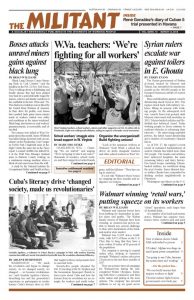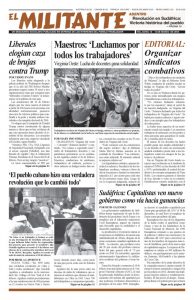CHARLESTON, W.Va. — Chanting “We are united!” and singing “We’re not going to take it any more!” thousands of teachers, school workers and their supporters locked hands above their heads on the steps of the state Capitol here Feb. 26. All the state’s school workers — teachers, bus drivers, cafeteria workers, custodians and others — walked out four days earlier, closing all the schools in West Virginia’s 55 counties.
For every school day of the walkout they rallied outside and inside the Capitol and at schools across the state. This is the first teachers strike in West Virginia since 1990.
“This all started with the health premiums,” Maria McCoy Hanna, a middle-school teacher in Greenbrier County, told the Militant. “Premiums are going up and I pay that out of pocket. The pay raise won’t even cover that.”
In West Virginia the state legislature decides on the wages and benefits for all workers in the public school system. Arguing that the state lacks the funds for health coverage, government officials voted to put this on the backs of workers. Legislators voted to increase the premiums and limit wage raises to 1 percent for each of the coming five years, outraging the workers.
Union locals in each of the 55 counties then met and members voted in all of them to authorize a statewide walkout before the end of the legislative session March 10.
Thousands of teachers and school service workers, joined by coal miners, students and other allies of their fight, gathered outside the Capitol Feb. 17, chanting “Fed up, fired up!” and “Enough is enough!
The legislature responded three days later by freezing imposition of the new premiums for 16 months and raising wages 2 percent in the first year.
West Virginia ranks 48th out of the 50 states in teachers’ wages. There are hundreds of vacancies across the state with neighboring states offering substantially higher pay.
“I took a $16,000 pay cut when I moved here from Kentucky,” McCoy Hanna said. “I work two jobs. I have to. I have student loans.”
The workers originally announced a two-day strike. “It is clear that education employees are not satisfied with the inaction of the legislative leadership or the governor to date,” the American Federation of Teachers, West Virginia Education Association and West Virginia School Service Personnel Association — the unions that represent the workers in the school system — said in a joint statement Feb. 23, extending the strike.
“We’ve got to stay out, and stay out together,” Scott Whitt, a Raleigh County school bus driver, told the Militant at the Feb. 26 rally. “A ‘rolling strike’ where only four or five counties at a time are out would be bad. That would be like the ‘selected strikes’ they started in the mines. It weakens us.”
State officials declared the work stoppage illegal, as they did in 1990. But so far they haven’t attempted to enforce the order.
“An injunction is not going to change anything,” Whitt said. “My grandfather was a UMWA miner. Back then, coal barons would have your house burned down if they wanted to. This is labor’s last chance. We have nowhere to go if we don’t fight now. Look at the nonunion workers at Walmart. They have no leg to stand on.”
Widespread support across the state
United Mine Workers President Cecil Roberts spoke at the Feb. 26 rally, calling on “every union member in the state of West Virginia — coal miners, steelworkers, rubber workers, electrical workers, everybody — to stand around these workers.”
Students in 12 counties released a joint open letter backing their teachers.
The workers have taken steps to minimize the impact of the walkout on other workers, aided by a broad social movement in their support. Churches, community centers, recreation centers and other groups have opened their doors to give children a place to go during school hours, which means their parents don’t have to miss work to care for them. Food drives and soup kitchens have been organized to make sure children who rely on schools for their lunch won’t go hungry.
Workers in West Virginia have faced an economic and social crisis for years. International competition and government regulations have caused a drop in demand for area coal, a key industry in the state. And coal bosses closed down or shifted production elsewhere to escape the United Mine Workers union. Coal mining jobs have plummeted in the state by 40 percent over the last five years. Today West Virginia has one of the highest rates of deaths from opioid overdoses in the country.
“In these circumstances, there is a lot of social tension building up here,” Thorn Roberts, who works in his family’s oil and gas business in Elizabeth, West Virginia, told the Militant Feb. 24. Pointing to miners’ labor battles 100 years ago, he said, “A lot has gone wrong since then. But the teachers strike may be an advance rumbling of something, like a preliminary seismic shock.”
Emma Johnson contributed to this article.



